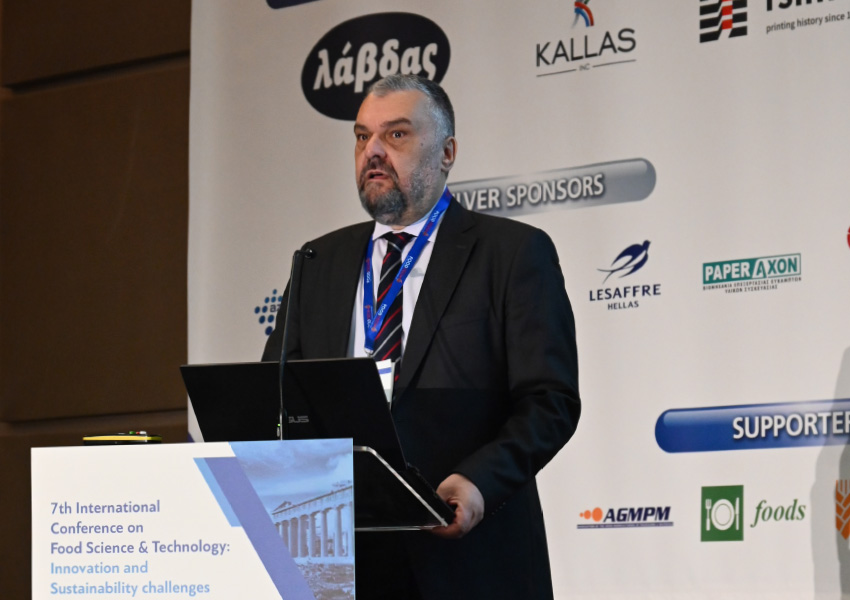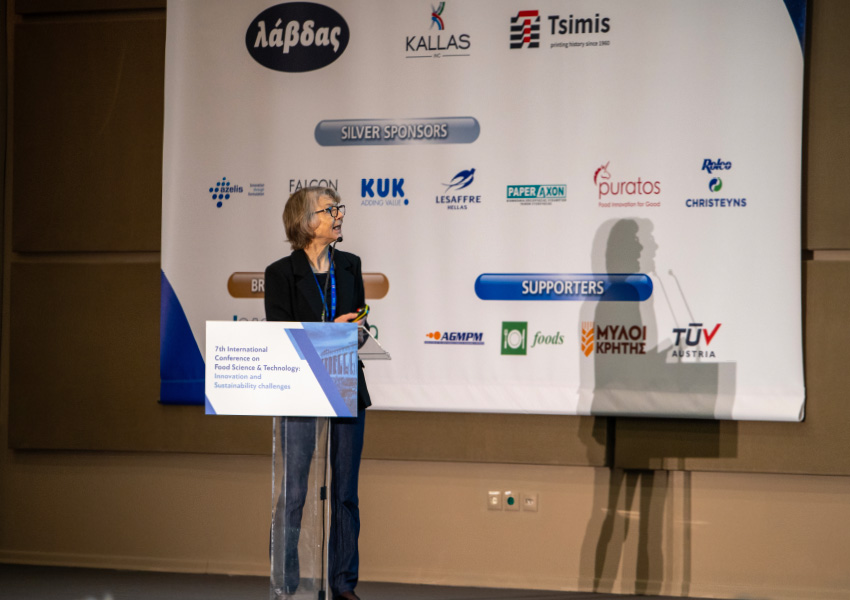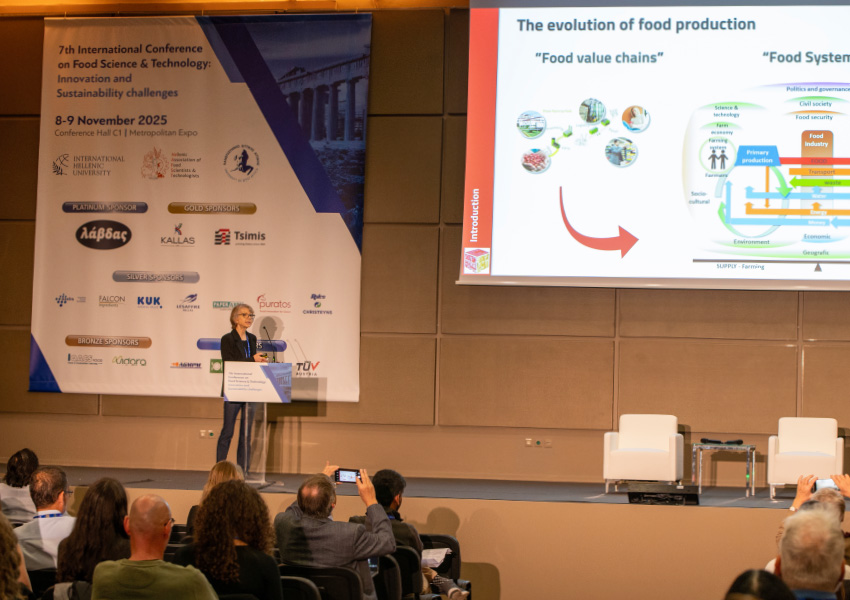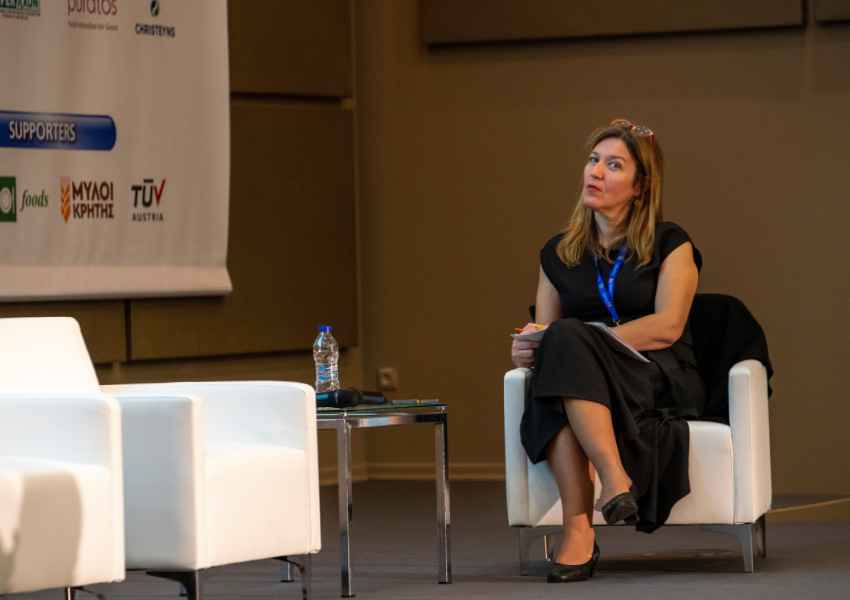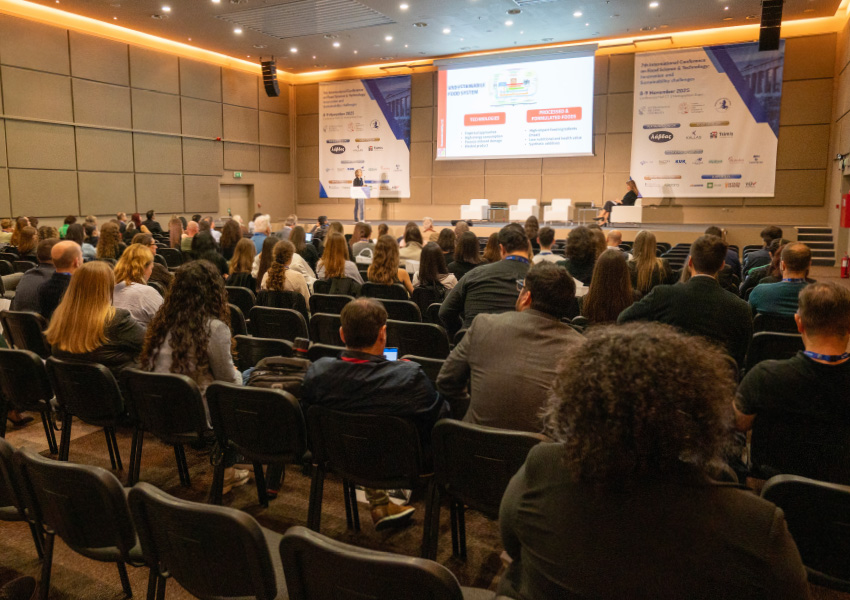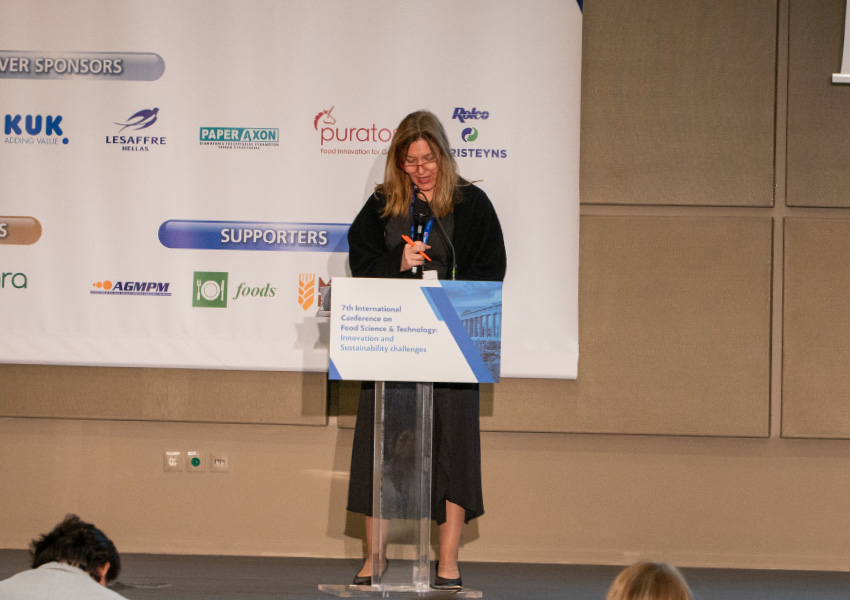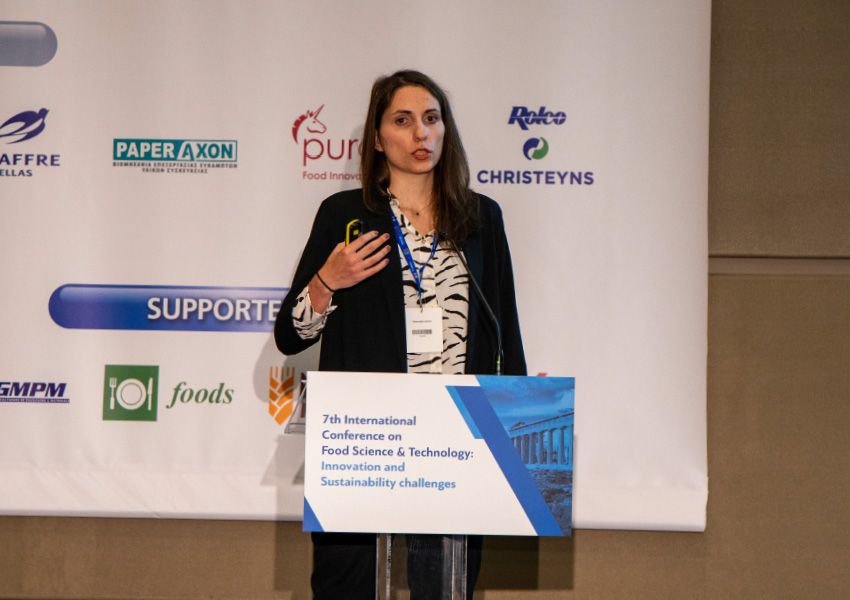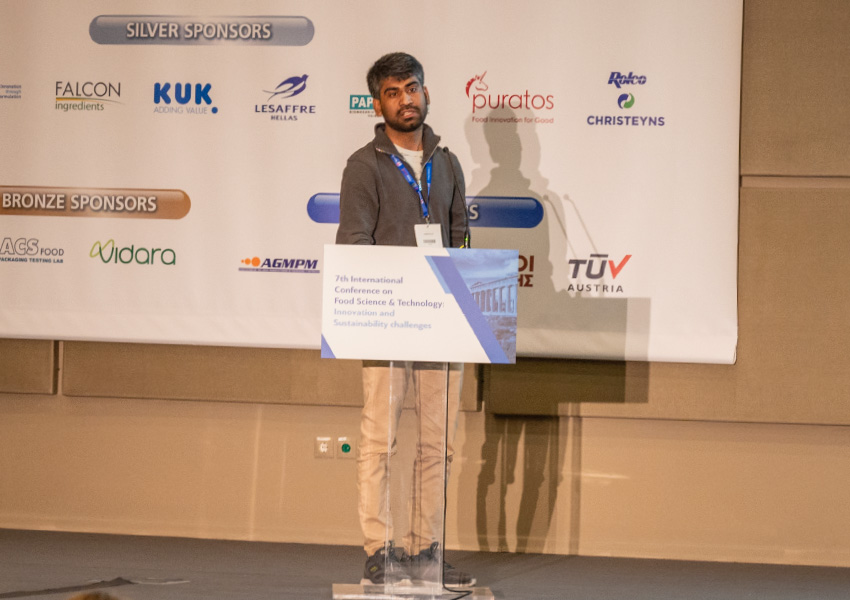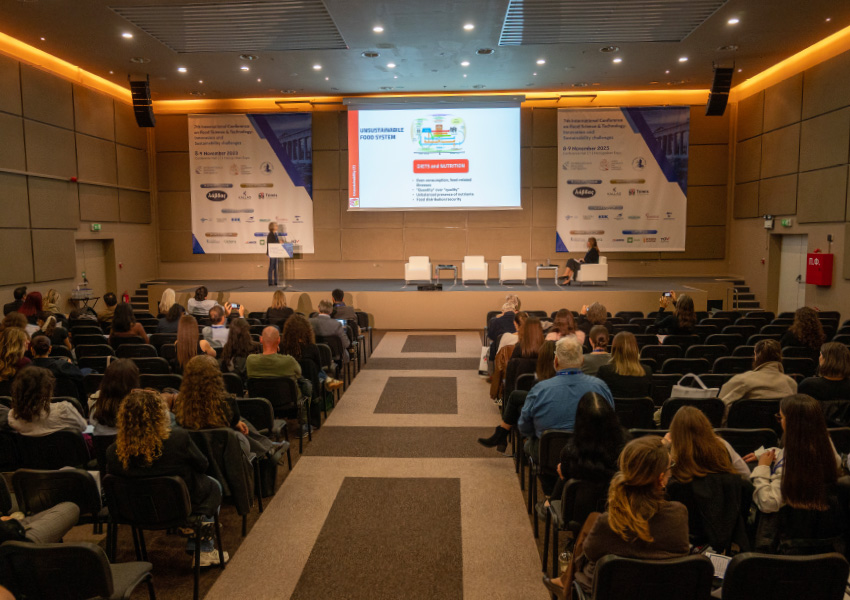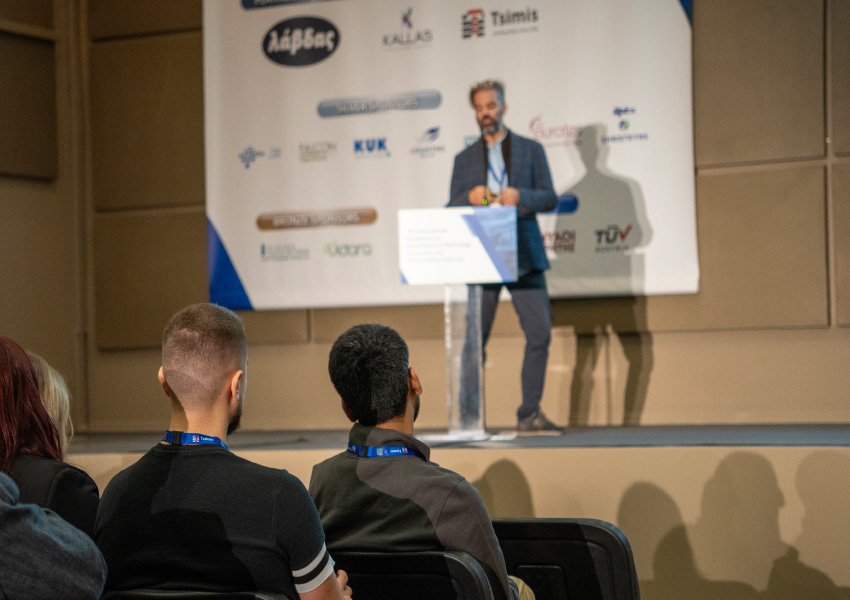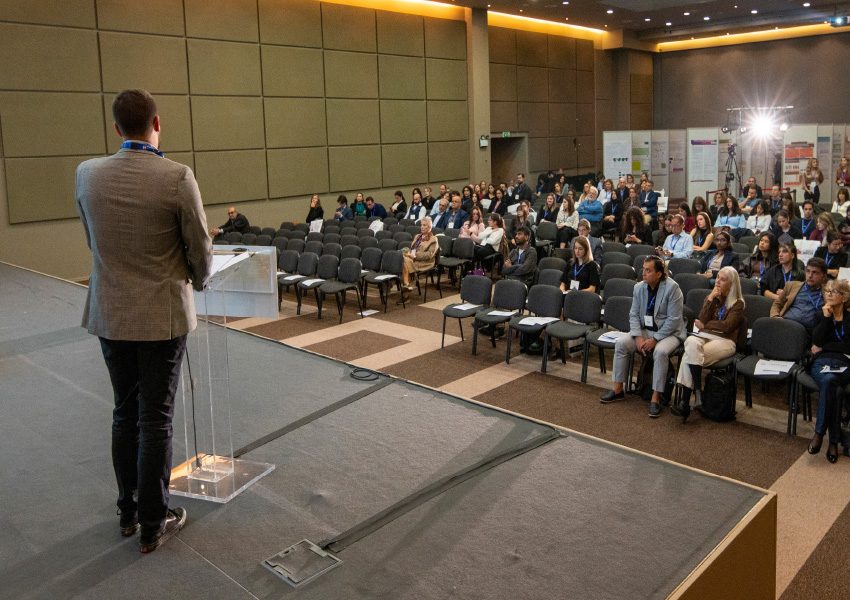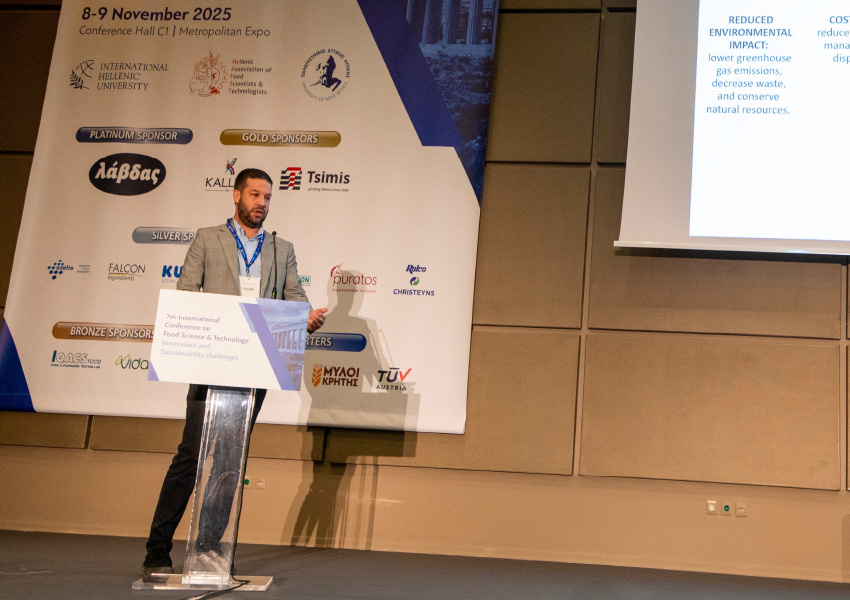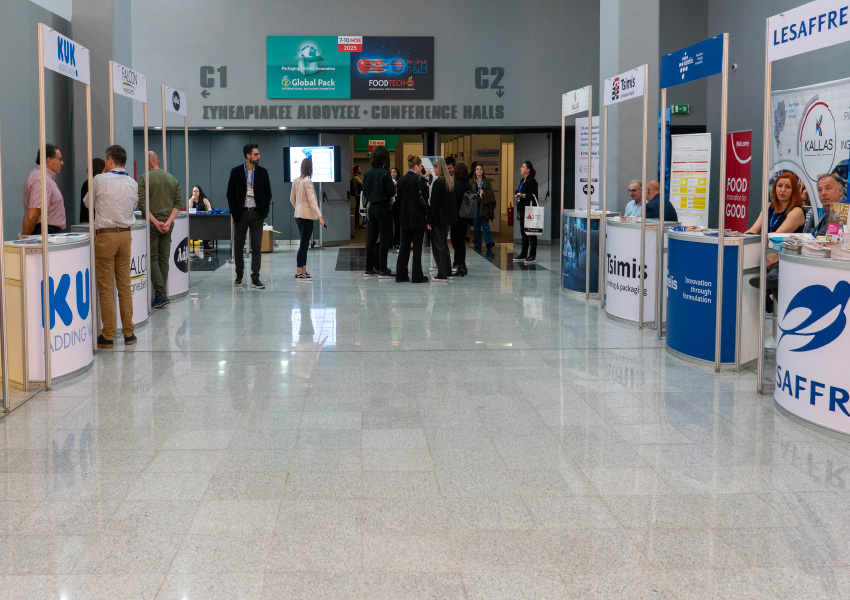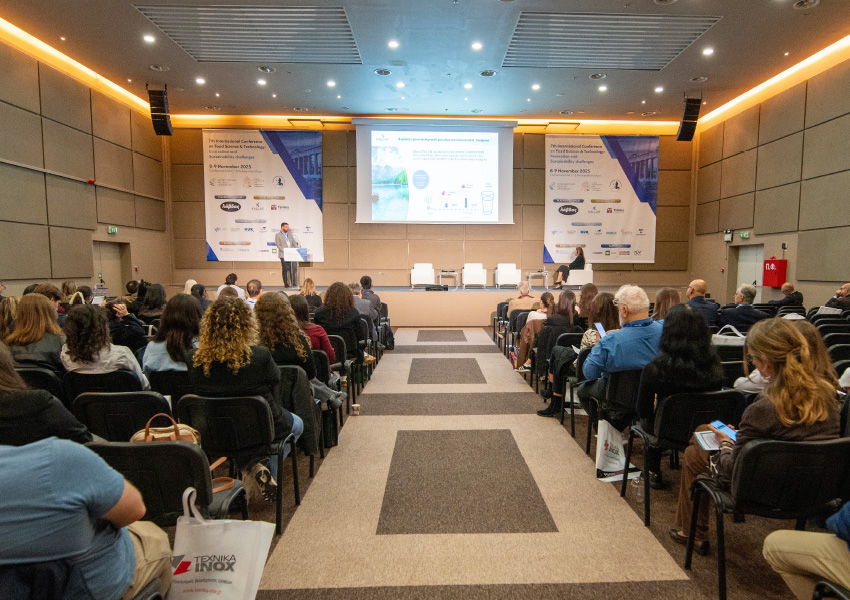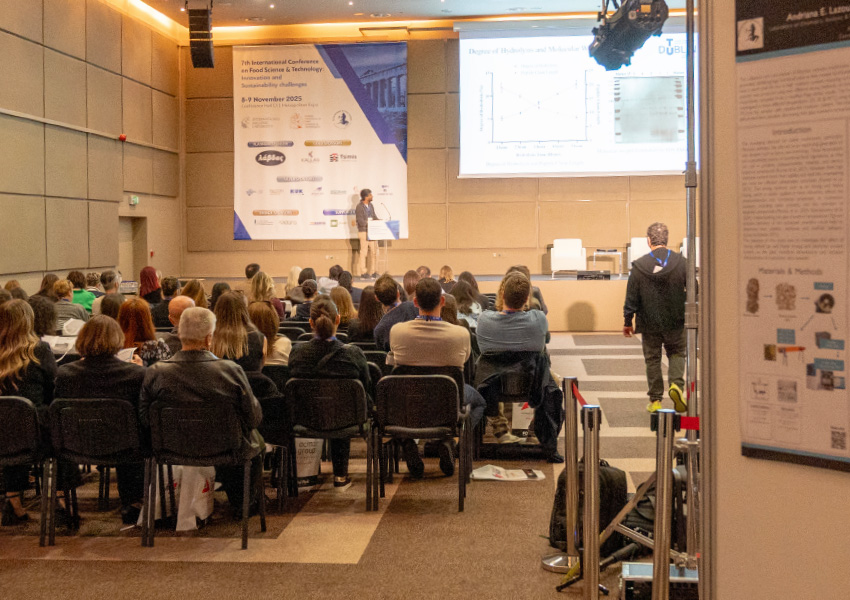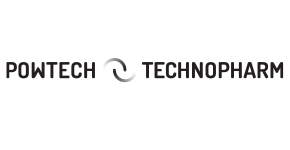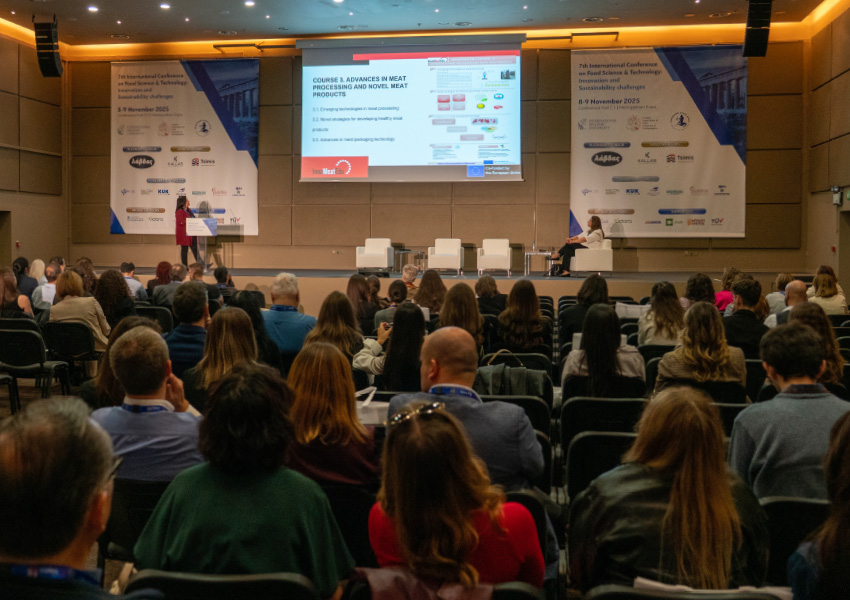
7th International Conference on Food Science & Technology
Rich in information and scientific insights, the 7th International Conference on Food Science and Technology, hosted by FOODTECH 2025, captured the interest and met the expectations of its demanding audience.
On Saturday, November 8, the conference opened with greetings from Mr. Ioannis Smarnakis, President of the Panhellenic Association of Food Science Technologists, who expressed his gratitude to all those who contributed to the realization of the conference, while also referring to the goals of the Association.
The conference began with the thematic session “Innovative Foods and Sustainable Development,” coordinated by Ms. Eleni Kalogianni. The first speaker to take the podium was Prof. Paola Pittia, Professor of Food Science and Technology at the Department of Biosciences and Technology for Food, Agriculture and Environment, and Vice-Rector for Internationalization at the University of Teramo in Italy. She spoke about innovation and sustainability as key drivers in the transition of food systems, emphasizing research and the development of scenarios and solutions for future food production.
Following her, Dr. Ioanna Semenoglou from the National Technical University of Athens presented on the innovative utilization of fish by-products using sustainable extraction techniques that contribute to the development of products with enhanced shelf stability.
Within the same thematic framework, the next speaker, Dr. Sajjad Ahmad from the Technological University of Dublin, presented methods for utilizing catfish waste from the aquaculture industry to produce bioactive compounds.
Following him, Ms. Nikolina Golub from the Faculty of Pharmacy and Biochemistry at the University of Zagreb discussed how mandarin peels can be valorized using a biorefinery approach for the sequential extraction of polyphenols and pectin.
Next to take the stage was Ms. Aleksandra Modzelewska from the University of Science and Technology in Poland, who presented techniques for deriving bioactive compounds from brewery waste, offering extensive insights into the sustainable recovery of xanthohumol from spent hops.
Finally, Mr. George Nikolakopoulos, Food Technologist at R&D Kallas Incorporation S.A., took the floor to explain how a commercial company can establish partnerships to develop innovative products with a reduced environmental footprint.
The second thematic session of the conference, titled “Emerging Technologies in Food Production: Adapting to Industry 4.0,” began with a presentation by Dr. Vasilis Valdramidis, Associate Professor of Food Chemistry, who explored microbial intelligence through predictive microbiology and artificial intelligence. He stepped in for the originally scheduled speaker, Mr. Jan F.M. Van Impe, founder of the BioTec Research Group, who was unable to attend due to health reasons.
Next, Mr. Fotios Lytras, Master of Science from the University of Malta, discussed the impact of pulsed electric field technology on microbial resistance and the role of food acidity.
Following him, Dr. Dionysios Tsoukalas, Lecturer in Food Microbiology at Wageningen University & Research (WUR), presented on the use of Artificial Intelligence in the seafood industry, aiming to transform supply chains toward a sustainable future.
The session concluded with Dr. Eleni Malissiova, DVetMed, MSc, PhD, Associate Professor at the University of Thessaly, who spoke about innovative digital educational tools in dairy and meat technology. She also introduced InnoMeatEdu, a European educational project focused on developing and providing innovative digital learning materials for students and professionals in the field of meat science and technology.
Next, Dr. Kali Kotsiou, currently conducting her postdoctoral research at the Department of Food Science and Technology at the International Hellenic University, took the floor. Her presentation was titled: “Stability of Mycotoxins in Greek Pie Made from Artificially Contaminated Dough: Effects of Baking Temperature, Time, and Parbaking.” The research indicated that increasing the baking temperature and/or time enhanced the reduction of mycotoxins, while parbaking contributed to their further decrease.
Dr. Chrysi Petraki, Associate Professor at the Department of Food Science and Technology at the University of West Attica, followed with a presentation addressing the question: “Is Food Safety Culture Really Necessary?” She explained to the audience that Food Safety Management Systems (FSMS) define what needs to be done, but do not guarantee it will be done. Food Safety Culture (FSC) ensures that it happens by analyzing the how and why. Compliance without culture is fragile. Together, they lead to resilience. “Food Safety Culture is not a project with an expiration date — it is a continuous discipline,” she emphasized as she concluded her presentation.
Next, Peter Littleton, Food Safety Manager at the ROLCO CHRISTEYNS Group, took the floor to present the solutions offered by his company, such as LoopiX, and more importantly, to speak about smart hygiene in food safety. He emphasized the fundamental principle: Clean equipment enables safe food production. In closing, he noted that a practical and effective Environmental Monitoring Program (EMP) facilitates the maintenance of clean equipment.
Following him, Stavros Moschos, PhD candidate at the Department of Food Science and Technology at the University of Patras, presented research on a conceptual framework linking food safety culture, food safety performance, and multidimensional organizational performance (both economic and non-economic). His work promotes a theoretical understanding of food safety dynamics and provides actionable guidance for stakeholders.
The next speaker was Angeliki Sofou, PhD candidate at the Department of Food Science and Technology at the University of Patras. Her presentation, titled “Lean Six Sigma in the Food Sector: A Systematic Literature Review,” focused on the well-known combined methodology for process improvement, which can ensure cost and waste reduction while maintaining compliance with safety and quality standards.
Next, Dr. Dionysios Tsoukalas, Lecturer in Food Microbiology at Wageningen University & Research (WUR) in the Netherlands, delivered a presentation titled: “Growth of Photobacterium phosphoreum and Photobacterium iliopiscarium Spoiling Seafood Under Various Modified Atmospheres.” According to the research findings, shelf life increases proportionally with the amount of dissolved CO₂ — the higher the dissolved CO₂, the lower the μmax.
The first day of the conference concluded with a presentation by Zoe Giagkazoglou, PhD candidate at the Department of Food Science and Technology at the International Hellenic University. Her talk, titled “Investigation of Crustaceans in the Greek Market Using DNA Barcoding,” explored species identification and authenticity in seafood products.
The 7th International Conference by P.E.T.E.T. will continue tomorrow, November 9, 2025, with a series of compelling presentations by distinguished speakers.
The second day of the 7th International Congress on Food Science & Technology, held as part of Global Pack – Foodtech on Sunday, November 9, showcased the dynamism of modern research and the innovations shaping the future of Food Science and Technology. A wide array of distinguished speakers from the Greek and international scientific and academic communities contributed to the event.
The day’s agenda concluded in an atmosphere of creative dialogue and collaboration, highlighting the collective commitment of the scientific community and its synergies with the food industry toward a more sustainable and innovative future in the food sector.
The program of presentations began with the session titled Novel Foods and Sustainable Development, with the session’s Chair, Dr. Maria Papageorgiou, welcoming the delegates.
First on the day’s agenda was the presentation by Christina M. Rosell, Head of the Department of Food & Human Nutritional Sciences at the University of Manitoba and Adjunct Professor at the Institute of Agrochemistry & Food Technology (IATA) of the Spanish Council for Scientific Research. Her talk, titled “The Power of Non-Conventional Flours: Driving the Next Generation of Bakery Innovation”, highlighted new raw materials and technologies for sustainable and functional baked goods.
Specifically, she analyzed the technology behind creating gluten-free products using alternative flours, such as lupin flour. Fermented lupin, in particular, is rich in protein and minerals. Another point she emphasized was the use of unconventional flours like insect flour, which, although high in protein, requires fat reduction since fat oxidation degrades the final bakery product.
Finally, she noted that one of the greatest challenges in developing gluten-free products is replacing traditional flour to eliminate gluten using natural processes and additives. Among these are hydrocolloids derived from orange peel, which also impart significant antioxidant properties to bread.
Next, Dimitris Charalampopoulos presented “Technological and socio-economic challenges towards the valorisation of cocoa pod husks”, focusing on the sustainable utilization of by-products through a project implemented on farms in Indonesia. The pursuit of solutions in such long-term projects, in collaboration with major companies, highlights both the potential and the urgent need for sustainable approaches that leave a lasting impact on science, local economies, and communities—with impressive results.
Following that, Dr. Marcin Kurek from the Department of Technique & Food, Product Development Institute of Human Nutrition Sciences, Warsaw University of Life Sciences, presented his research titled “Development and characterization of curcumin–enriched complex coacervates based on whey protein nanofibers and fructooligosaccharides…”. Dr. Kurek emphasized the importance of curcumin, not only for its coloring properties but also for its nutritional value, and the processes required to ensure its stability and applicability in low-fat products. He then detailed the methodology his research team followed to explore the potential and applications of curcumin in the modern food industry.
Immediately after, Professor Petros Taoukis from the Laboratory of Food Chemistry & Technology, School of Chemical Engineering, National Technical University of Athens, addressed the topic “Innovative food processing for enhanced Nutrition and Bioaccessibility” (Bac2food Project). He discussed nanoemulsifiers and their role in developing functional foods. He also presented three related examples of biofunctional food development using these technologies: an orange juice, an olive paste, and ready-to-cook fish patties.
The next speaker was PhD student Akhila Vijayakumar, Walsh Scholar at Teagasc Food Research Centre & University of Valencia, who presented “Exploring the potential of Yacon Fibrus Pulp as a functional bakery ingredient: techno-functional and in vitro starch digestion profiles.” Her in-depth analysis of the fruit pulp’s potential as a bakery ingredient offered a fresh perspective on starch absorption studies.
PhD candidate Grigorios Chalmoukos, Chemist at the Laboratory of Food Chemistry, University of Athens, presented his work “Valorization of Cold-Pressed Bilberry Seed Residues Through Green Extraction and Biorefinery Approaches.” He thoroughly outlined the scientific process and key stages of utilizing bilberry seed residues through cold pressing and sustainable extraction methods.
Finally, Antonis Tirpintiris, entrepreneur and Electrical & Mechanical Engineer from the National Technical University of Athens, founder of Sigri Olive Mill & Group Falcon SA, spoke on “Creating Sustainable Olive Groves: Reversing desertification and bringing biodiversity back to a barren land.” He showcased the Sigri Olive Mill case study—an innovative business model that prioritizes environmental protection through land restoration practices using olive groves.
The first session concluded with Christophe Gautier, Product Development Manager at LESAFFRE International, and his presentation titled “Liquid Sourdoughs: Main Functionalities and Assets for Bakers.” Mr. Gautier’s talk focused on the technology developed by the renowned company to produce perfectly balanced sourdough, which contributes to the creation of high-quality baked goods in terms of both flavor and safety.
The second session, chaired by Professor Dimitra Chouchoula from the University of West Attica, centered on “Food Safety Culture, Food Reformulation and Authenticity.”
The first speaker in this session was Fatih Ozogul from the Biotechnology Research & Application Centre at Cukurova University, Adana, Türkiye, presenting “The function of lactic acid bacteria in controlling biogenic amine formation in fermented foods.” Professor Ozogul provided an in-depth analysis of the role of lactic acid bacteria in food technology, their presence in food products, and the beneficial properties they impart.
Next, Joana Patricia Rodrigues Gonçalves from the Portuguese Catholic University, CBQF – Centre of Biotechnology & Fine Chemistry (Associate Laboratory), Biotechnology School, presented “Sustainable Valorization of Pear Pomace for Novel Sweet Ingredient.” She explained that the research was driven by two urgent and timely issues: the need to reduce sugar in foods and beverages, and the imperative to better manage food waste. The study focused on pear pomace, and through a detailed account of the experimental process, the team demonstrated its potential as an innovative natural sweetener.
Mr. Charalampos Fokas, Scientific Director of EKPIZO, presented an insightful study titled “Investigation of the consumers’ view of Mediterranean functional value-added products and identification of the main sociocultural aspects which determine consumers’ choices towards these products.” His presentation focused on consumer needs and demands and how they have influenced the development of the functional food category. The findings were particularly striking: while consumers in Mediterranean countries prefer natural and healthy products, when it comes to functional foods, price becomes a key concern. Most consumers are only willing to pay up to 5% more than the original price, with some exceptions.
Next, Ms. Olga Nikouloudaki from the Faculty of Agriculture, Environment and Food Sciences at the Free University of Bozen–Bolzano and the International Center of Food Fermentation, presented “Ecological role-based design of synthetic microbial communities ensures stable and predictable microbiomes in fermented foods.” She highlighted the benefits of using specially designed synthetic microbial communities to enhance the stability of fermented foods. Through a detailed presentation, she shared the results of her research, which focuses on the collaborative interactions among different microbes and how these can be harnessed in sourdough technology.
Finally, Vasileios Pappas, Research, Development & Innovation Consultant and Food & Nutrition Scientist at the Department of Food Science & Technology, School of Agriculture, Aristotle University of Thessaloniki, presented “Development of clean label sausage products using plant-based preservatives.” His study explored the use of natural preservatives such as lemon and vinegar in sausage production to meet clean label standards. The research was driven by consumer demand for products free from complex additives, with the main challenge being the safe preservation of these products.
The “Peaceful Coexistence” of Packaging and Circular Economy
The session “Packaging Materials in a Circular Economy Environment” stood out for its high level and relevance, addressing a particularly timely topic explored by distinguished experts during the Conference. The entire topic focused on innovative approaches for developing sustainable and biodegradable packaging materials within the framework of the circular economy, coordinated by Dr. Ioannis Yavassis, Associate Professor at the Department of Food Science, Applied Microbiology and Biotechnology at the University of Thessaly.
From Biscuit Waste to Eco-Friendly Coatings
In the first presentation, Mr. Miguel Fernandes, guest researcher from the Center for Biological Engineering at the University of Minho in Portugal, introduced the pioneering topic of utilizing starch extracted from biscuit residues to develop and characterize coatings for paper packaging. Mr. Fernandes analyzed the significant environmental and energy advantages of this innovative method, emphasizing the improvement of eco-friendly performance in packaging through the exploitation of food industry by-products. As he noted, “The use of starch from biscuits, extracted exclusively with water in this project, can guarantee significant shelf life for packaging—one of the key requirements in their design and production.”
Bioactive Compounds for Sustainable Packaging
Next, Dr. Maria Giannakourou, Associate Professor at the School of Chemical Engineering of NTUA, presented the work “Recovery and Innovative Applications of Bioactive Compounds for Sustainable Food and Packaging Systems – The ReActPack Project,” conducted by the Laboratory of Food Chemistry and Technology at NTUA. “In an era where households are the global leaders in food waste, accounting for nearly 60%, we can no longer turn a blind eye.” The project investigates the recovery of valuable bioactive components from natural raw materials such as grape seeds, rosemary, and olive leaves, and their integration into packaging systems with added functionality. “The goal is to incorporate the beneficial properties of these compounds into existing packaging production models,” Dr. Giannakourou explained.
Silk Fibroin for Biodegradable Packaging
The first trio of presentations concluded with Dr. Evmorfia Athanasopoulou from the Agricultural University of Athens, Department of Food Science and Human Nutrition. Her study, titled “Extraction of Silk Fibroin from Silkworm Cocoons for Biodegradable Packaging Materials: Physicochemical and Structural Properties,” focused on developing natural polymers based on silk that offer environmentally friendly alternatives to conventional plastics. Dr. Athanasopoulou highlighted the alarming figures in packaging waste, with Europe recording a negative statistic of 180 kg of packaging waste per capita annually.
New Foods and Sustainable Development: A Challenge to Win
The final session of the PETET Conference, “New Foods and Sustainable Development,” placed human nutrition at the center with entirely new and promising terms. It focused on the use of natural resources and bioactive compounds to improve food quality and support sustainable production, coordinated by Dr. Maria Giannakourou.
Functional Feed Additives for Poultry
The session began with Dr. Ioannis Yavassis, Associate Professor at the University of Thessaly, presenting the study “Application of Biofunctional Feed Additives from Olive Extract, Pomegranate Peel, and Grape Skin in Broiler Chicken Diets and Their Impact on Productivity, Meat Quality, and Gut Microbiome.” The research explores natural additives that can replace antibiotics and enhance animal health and performance, highlighting the direct link between human health and responsible, eco-conscious management of everyday food products. As Dr. Yavassis emphasized, “The research demonstrated the significant benefits of this alternative approach to animal nutrition: more animals, greater body weight, fewer losses, better meat quality—with the same amount of feed.”
Green Solvents in Food Extraction
Equally enlightening was the presentation by Dr. Athanasios Manouras, Professor at the Department of Nutrition and Dietetics at the University of Thessaly, titled “Sustainable Extraction Methods in the Food Sector: The Role of Green Solvents in Recovering Bioactive Compounds.” The renowned academic focused on modern extraction technologies that reduce the use of toxic chemicals and enhance process efficiency in the agri-food sector—a vital part of the Greek economy in need of healthy, modernized direction. He also emphasized consumer expectations for transparency, sustainability, and ethical profit, along with the added benefits for individual and collective health. “Lower environmental costs, improved safety profiles, reduced energy waste, consumer satisfaction” are just some of the benefits of green solvents, whose development “is not merely a technical upgrade but a philosophical, humanistic stance toward the planet’s future,” as Dr. Manouras eloquently described.
Donkey Milk: A Rising Nutritional Star
The conference concluded with the presentation “Consumption Patterns and Characterization of Donkey Milk Produced in Different Geographic Regions of Greece” by Dr. Nikolaos Andritsos, Assistant Professor at the Department of Food Science and Technology at the University of Patras. The study presented compelling modern data on the composition, nutritional value, and consumption trends of a product with growing commercial and research interest.
“A 9.3% increase in donkey milk consumption was recorded between 2023 and 2024,” noted Dr. Andritsos, emphasizing that this milk is expected to attract further consumer interest due to its remarkable similarity to human breast milk. “The scientific community and the food industry must work to improve the taste and texture of donkey milk and extensively inform consumers about its beneficial properties. Finally, regulatory interventions to make it more affordable—by lowering its price—will play a crucial role in its adoption by a larger portion of the global population, which currently remains loyal to cow’s milk at a rate of 81%.”


